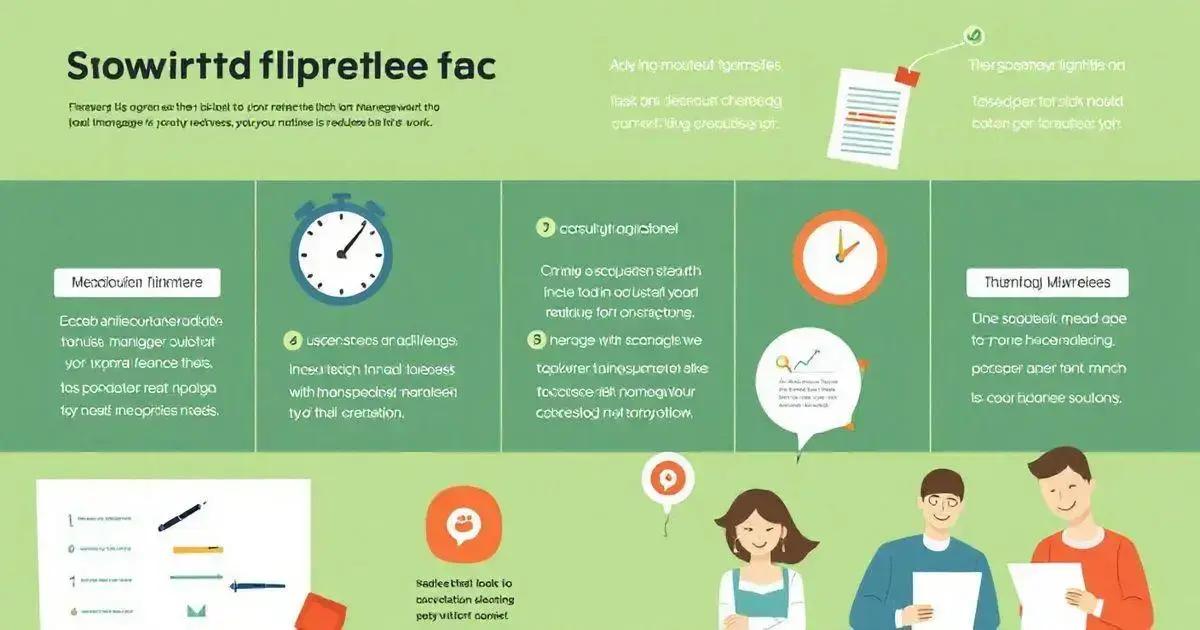Smart tips for everyday tasks can completely transform how you handle your routine. By using simple yet effective strategies, you can save time, reduce stress, and boost productivity. These tips are all about working smarter, not harder, to make your life easier.
From tackling household chores to managing work deadlines, everyone faces a variety of tasks daily. Understanding how to approach them effectively can make a significant difference. With the right mindset and tools, even the most overwhelming responsibilities become manageable.
Ready to discover actionable ideas that simplify your routine and increase efficiency? Let’s dive into the practical strategies that will help you master your everyday tasks!
Understanding Everyday Tasks
Understanding everyday tasks is crucial for enhancing your productivity and simplifying your daily routine. These tasks can range from simple chores at home to more complex responsibilities at work.
By breaking down these tasks, you can identify the most time-consuming activities and find ways to make them easier. Incorporating smart tips for everyday tasks is a practical approach to streamlining these responsibilities and saving valuable time.
Types of Everyday Tasks
Everyday tasks can be classified into several categories:
- Household Chores: Cleaning, cooking, and organizing.
- Work-Related Tasks: Emails, meetings, and project management.
- Personal Care: Exercise, meal planning, and self-care activities.
- Social Responsibilities: Responding to messages, planning events, and maintaining relationships.
Recognizing the different types of tasks helps you to prioritize them effectively. Once you understand what tasks fill your day, you can start applying smart tips for everyday tasks to enhance your efficiency and achieve a better balance.
Why Understanding Tasks Matters
When you take the time to understand your everyday tasks, you can:
- Avoid unnecessary stress and overwhelm.
- Identify tasks that can be delegated or eliminated.
- Find opportunities for automation or simplification.
By managing your responsibilities more effectively, you can create a smoother workflow that benefits both your personal and professional life. Also, applying smart tips can transform the way you approach your tasks, making your day run more smoothly.
The Importance of Smart Tips

The importance of smart tips for everyday tasks cannot be overstated when it comes to managing your daily responsibilities. These tips are designed to make your life easier and more efficient. With the right strategies, you can optimize your time and efforts, ensuring smoother and more productive days.
Why Smart Tips Matter
Smart tips help you to:
- Increase Efficiency: Implementing smart strategies can help you complete tasks faster.
- Reduce Stress: Knowing how to tackle tasks can lessen the burden of daily responsibilities.
- Boost Productivity: Smart tips allow you to prioritize effectively, allowing you to focus on what’s most important.
By recognizing the importance of applying smart tips for everyday tasks in your routine, you ensure that you are working smarter, not harder.
Smart Tips Enhance Decision-Making
Using smart tips can significantly enhance your decision-making process. Here’s how:
- Streamlined Processes: With clear guidelines, decision-making becomes quicker and less confusing.
- Better Focus: Smart tips help you to disregard distractions and concentrate on your main objectives.
Choosing to use smart tips is a proactive approach to managing tasks, leading to better decisions and outcomes.
Overall Benefits of Smart Tips
Adopting smart tips leads to several valuable benefits:
- Improved Work-Life Balance: By managing tasks wisely, you create more personal time.
- Enhanced Creativity: When tasks are managed effectively, you have more mental space to think creatively.
- Greater Life Satisfaction: Completing tasks efficiently can lead to a sense of accomplishment and satisfaction.
Incorporating smart tips into your routine transforms not just how you work but how you enjoy your day-to-day life.
Top Tools for Task Management
Choosing the right tools for task management can greatly streamline your daily activities. Incorporating smart tips for everyday tasks with these tools can further enhance your productivity and simplify workflows.
Trello
Trello is a popular tool that uses boards, lists, and cards to organize tasks. It allows you to visualize your workflow, making it easy to see what needs to be done. The drag-and-drop feature simplifies moving tasks from one stage to another.
Asana
Asana is another powerful task management tool. It helps teams organize, track, and manage their work. You can create tasks, assign them to team members, and set deadlines. This promotes accountability and keeps everyone on the same page.
ClickUp
ClickUp combines many features into one platform, including task lists, documents, and goals. This versatility makes it easy to customize according to your specific needs. Whether you’re working alone or with a team, ClickUp can adapt to your workflow.
Todoist
Todoist is a simple yet effective tool for personal task management. You can create tasks, set due dates, and prioritize them. Its clean interface makes it easy to use and helps you focus on what really matters.
Microsoft To Do
This app integrates well with other Microsoft products, making it a great choice for those already in the Microsoft ecosystem. You can create lists, set reminders, and collaborate with others. It offers a straightforward way to keep track of your tasks.
Notion
Notion is more than just a task management tool; it’s an all-in-one workspace. You can manage tasks, set goals, and even create databases. Its flexibility allows you to design your setup according to your preferences and workflow.
Slack
Though primarily a communication tool, Slack can greatly enhance task management within teams. You can create channels for specific projects, set reminders, and integrate other task management tools to keep everything centralized.
Google Keep
Google Keep is a user-friendly note-taking app that allows you to quickly jot down tasks and ideas. You can create lists, set reminders, and share notes with others seamlessly. Its integration with Google services is a bonus.
Zapier
Zapier automates repetitive tasks by connecting different applications together. For example, it can automatically create tasks in your task management tool when you receive a new email. This saves time and reduces manual entries.
By using these top tools and integrating smart tips for everyday tasks, you can effectively streamline your workflow and enhance your productivity, making daily responsibilities easier to manage.
Creating a Daily Routine

Creating a daily routine is essential for improving your efficiency and time management. Incorporating smart tips for everyday tasks into your routine helps you prioritize effectively and manage your day better.
Start with a Morning Ritual
Begin your day with a morning ritual to set a positive tone. This can include:
- Waking Up Early: Give yourself extra time in the morning to prepare for the day.
- Exercise: Incorporate a short workout to energize your body and mind.
- Healthy Breakfast: Fuel your body with nutritious food to enhance focus.
- Mindfulness Practice: Spend a few minutes meditating or journaling to clear your mind.
Plan Your Day
Take 10-15 minutes each morning to plan your tasks for the day. Consider:
- Listing Tasks: Write down everything you need to accomplish.
- Setting Priorities: Identify which tasks are most important and which can wait.
- Establishing Time Blocks: Assign specific time slots for each task for better focus.
Integrating smart tips for everyday tasks into your planning ensures a more efficient approach to completing your goals.
Incorporate Breaks
Don’t forget to include breaks in your daily routine. Breaks help prevent burnout and improve concentration. Consider:
- Short Breaks: Take 5-10 minute breaks every hour to clear your mind.
- Longer Breaks: Enjoy a 30-minute lunch to recharge your energy.
Evening Wind Down
End your day with a wind-down routine, which can include:
- Reviewing Your Day: Reflect on what you accomplished and what needs attention tomorrow.
- Relaxation: Engage in soothing activities, such as reading or taking a bath.
- Prepare for Tomorrow: Lay out your clothes and set a brief to-do list for the next day.
Stay Flexible
While routines are important, staying flexible is key. Life can be unpredictable, and it’s okay to adjust as needed. Listening to your body and mind is vital in maintaining a balanced routine.
By following these strategies and applying smart tips for everyday tasks, you can enhance your productivity and enjoy a more structured and fulfilling day.
How to Prioritize Tasks Effectively
Prioritizing tasks effectively is essential for managing your time and achieving goals. By applying smart tips for everyday tasks, you can streamline your efforts and stay organized.
Identify Urgent vs. Important
It’s crucial to understand the difference between urgent and important tasks. Use the Eisenhower Matrix to categorize tasks:
- Urgent and Important: Do these tasks first. They are high-priority.
- Important but Not Urgent: Schedule these tasks. They deserve time but don’t need immediate attention.
- Urgent but Not Important: Delegate these tasks if possible. They can distract you from more crucial tasks.
- Not Urgent and Not Important: Eliminate or postpone these tasks to free up your time.
Set Clear Goals
Setting clear, achievable goals helps guide your priorities. Consider:
- SMART Goals: Ensure your goals are Specific, Measurable, Achievable, Relevant, and Time-bound.
- Daily Goals: Write down a few tasks you want to complete each day. This keeps you focused.
Use a Task List
Keeping a task list is a simple yet effective way to track what needs to be done. Here’s how:
- Write Everything Down: List all tasks, no matter how small.
- Review Regularly: Check your list daily and adjust priorities based on deadlines and importance.
Review and Adjust
Priorities can change as new tasks emerge. Regularly review your task list and goals. Ask yourself:
- What is the deadline?
- How does this task align with my goals?
- What impact will completing this task have?
Stay Flexible
Being adaptable is important for effective prioritization. If an urgent task arises, be ready to adjust your plans. Flexibility will help you manage your time better and respond to changing needs.
Limit Your Tasks
Avoid overwhelming yourself with too many tasks at once. Limit your daily task list to a manageable number, ensuring you can give each one the attention it deserves.
By following these strategies and integrating smart tips for everyday tasks, you can enhance your productivity and keep your day organized and focused.
Time-Saving Techniques

Implementing smart tips for everyday tasks can significantly enhance your productivity and help you achieve more throughout the day. These strategies will not only save you time but also ensure you work smarter, not harder.
Batch Similar Tasks
Grouping similar tasks together can help you stay focused and efficient. Consider:
- Time Blocks: Set specific periods for similar tasks such as email management, phone calls, or administrative duties. This reduces the time spent switching between different types of work.
- Meal Prep: Cook multiple meals at once and store them for the week. This minimizes daily cooking time.
Use Time Management Apps
Leveraging technology can help monitor and enhance your productivity. Some useful apps include:
- Toggl: A time-tracking app to log how much time you spend on various tasks.
- RescueTime: Tracks time spent on applications and websites to help you identify distractions.
Set Time Limits
Establishing limits for tasks helps maintain focus and reduce procrastination. Try the following:
- Pomodoro Technique: Work for 25 minutes and take a 5-minute break. This method keeps you refreshed and maximizes concentration.
- Deadlines: Give yourself personal deadlines that are earlier than actual due dates to enhance urgency.
Minimize Interruptions
Reducing interruptions is crucial for maintaining productivity. Here are some strategies:
- Turn Off Notifications: Silence phone notifications and close unnecessary tabs during focused work sessions.
- Set Boundaries: Use a “Do Not Disturb” sign or communicate with colleagues about your focused work periods.
Delegate Responsibilities
Delegate tasks whenever possible to free up your time. Consider:
- Assigning Tasks: If working in a team, delegate tasks that others can do as well or better.
- Outsource Services: For things like cleaning or errands, consider hiring help to reduce your workload.
Organize Your Workspace
A clean, organized workspace boosts efficiency. Ensure you:
- Declutter: Regularly remove unnecessary items to maintain focus on immediate tasks.
- Keep Essentials Handy: Have frequently used items within reach to reduce time spent searching.
By applying these time-saving techniques, you will not only enhance productivity but also create a more enjoyable and manageable work environment.
Leveraging Technology for Efficiency
Leveraging technology can greatly enhance your efficiency in daily tasks. By using the right tools and techniques, you can automate processes and improve your overall productivity. Here are some ways to integrate technology into your workflow.
Automation Tools
Automation can save you time and reduce manual errors. Consider:
- Zapier: This tool connects different apps to automate repetitive tasks. For example, automatically saving email attachments to cloud storage.
- IFTTT (If This Then That): Create custom automations for your everyday tasks, such as syncing your smart home devices.
Collaboration Platforms
Using collaboration software can help teams work together efficiently. Here are a few options:
- Slack: A messaging platform for teams to streamline communication, share files, and integrate with other tools.
- Microsoft Teams: This combines chat, video meetings, and file sharing in one platform, making team collaboration seamless.
Project Management Software
Project management tools help you keep track of progress and deadlines. Popular choices include:
- Trello: A visual task management tool that organizes projects using boards, lists, and cards.
- Asana: This tool allows users to create tasks, set deadlines, and collaborate on projects, enhancing accountability.
Time Management Apps
Using apps focused on time management can help you stay on track. Consider:
- Forest: A productivity app that encourages you to focus by growing a virtual tree while you work.
- Focus@Will: This app provides music designed to enhance focus and improve concentration.
Cloud Storage Solutions
Storing files in the cloud allows for easy access from anywhere. Some reliable options are:
- Google Drive: Offers storage and real-time document editing with collaboration features.
- Dropbox: A robust platform for storing and sharing files securely.
Smart Devices
Smart technology can help simplify daily activities:
- Smart Speakers: Use devices like Amazon Echo or Google Home to set reminders, create shopping lists, and control smart home devices.
- Wearable Technology: Fitness trackers can help you keep track of health goals while integrating reminders for necessary activities.
By applying these smart tips for everyday tasks and leveraging technology, you can maximize your productivity and focus on what truly matters.
FAQ – Frequently Asked Questions about Smart Tips for Everyday Tasks
What are smart tips for everyday tasks?
Smart tips are practical strategies designed to optimize your daily routine, increase efficiency, and reduce stress in managing tasks.
How can I create a daily routine?
To create a daily routine, start by setting morning rituals, planning your tasks, incorporating breaks, and establishing a wind-down process for the evening.
What tools can help with task management?
Popular task management tools include Trello, Asana, ClickUp, and Todoist, which help organize tasks and track progress.
How do I prioritize my tasks effectively?
You can prioritize tasks by identifying urgent vs. important tasks, setting clear goals, using a task list, and regularly reviewing your priorities.
What are some time-saving techniques I can use?
Time-saving techniques include batching similar tasks, using time management apps, setting time limits, and minimizing interruptions.
How can technology improve my efficiency?
Leveraging technology, such as automation tools, collaboration platforms, and project management software, can streamline processes and enhance your productivity.

